高中英语必修四:Unit+5+Theme+Park+Listening+and+Speaking+教案.doc
高中人教版英语人教版高中必修4【教学设计】Unit 5(英语人教必修四)
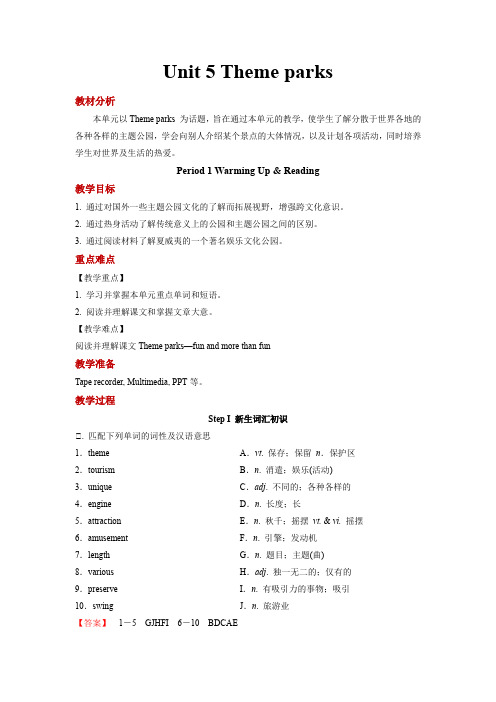
Unit 5 Theme parks教材分析本单元以Theme parks 为话题,旨在通过本单元的教学,使学生了解分散于世界各地的各种各样的主题公园,学会向别人介绍某个景点的大体情况,以及计划各项活动,同时培养学生对世界及生活的热爱。
Period 1 Warming Up & Reading教学目标1. 通过对国外一些主题公园文化的了解而拓展视野,增强跨文化意识。
2. 通过热身活动了解传统意义上的公园和主题公园之间的区别。
3. 通过阅读材料了解夏威夷的一个著名娱乐文化公园。
重点难点【教学重点】1. 学习并掌握本单元重点单词和短语。
2. 阅读并理解课文和掌握文章大意。
【教学难点】阅读并理解课文Theme parks—fun and more than fun教学准备Tape recorder, Multimedia, PPT等。
教学过程Step I 新生词汇初识Ⅰ. 匹配下列单词的词性及汉语意思1.theme A.vt. 保存;保留n.保护区2.tourism B.n. 消遣;娱乐(活动)3.unique C.adj. 不同的;各种各样的4.engine D.n. 长度;长5.attraction E.n. 秋千;摇摆vt. & vi. 摇摆6.amusement F.n. 引擎;发动机7.length G.n. 题目;主题(曲)8.various H.adj. 独一无二的;仅有的9.preserve I.n. 有吸引力的事物;吸引10.swing J.n. 旅游业【答案】1-5GJHFI6-10BDCAEⅠ. 选择下列句中相对应词组的汉语意思A.非常B.根据……模仿C.熟悉D.以……而闻名E.实现F.难怪1.This restaurant is famous for its delicious dishes.2.I am familiar with the computer software they use.3.Her dream to enter the famous university came true.4.The two buildings are modelled after the same pattern.5.No wonder you can't find anybody here;they're all away at a meeting.6.I was more than happy when I heard the news.【答案】1-6DCEBFAStep II 教材语篇细研第一步速读——了解文章主题和段落大意速读P34教材课文,匹配段落大意1.Para.1A.To introduce Disneyland.2.Para.2B.To introduce theme parks.3.Para.3 C.To introduce Camelot Park.4.Para.4D.To introduce Dollywood.【答案】1-4BADC第二步细读——把控文章关键信息细读P34教材课文,选择最佳答案1.According to the passage,tourists can find Snow White and Mickey Mouse in .A.World Waterpark B.DisneylandC.Central Park D.Camelot Park2.What's the Dollywood's main attraction?A.Its culture.B.Its country music.C.Its candy shops.D.Its wooden roller coaster.3.It can be inferred from the third paragraph that the main purpose of Dollywood is to .A.entertain B.make profitsC.show cartoons D.educate people4.Which of the following can follow the last paragraph?A.An introduction of some other theme parks.B.Mickey Mouse in Disneyland.C.Dollywood's old wooden roller coaster.D.Something about a traditional park.【答案】1-4BADA第三步精读——能力升华接轨高考精读P34教材课文,在空白处填入1个适当的单词或括号内单词的正确形式。
人教新课标高中英语必修四Unit 5 Theme parks教案(5)

新人教版高一英语必修四Unit 5 Themeparks 教案Unit 5 Theme parks1. 教材分析本单元以Theme parks 为话题,旨在通过本单元的教学,使学生了解分散于世界各地的各种各样的主题公园,学会向别人介绍某个景点的大体情况,以及计划各项活动,同时培养学生对世界及生活的热爱。
Warming up通过向学生呈现四个风格各异的世界著名主题公园,激发学生学习本单元的兴趣。
Pre-reading 通过学生对主题公园里活动的想象,交流了解主题公园的有关知识。
Reading 通过介绍世界各地形式各异的主题公园概况,使学生了解风格迥异的各国主题公园。
Comprehending 让学生从文章的标题及各段大意来整体理解课文。
Learning about Language 分词汇和语法两部分。
Discovering useful words and expressions 中的练习1是以给出意思写出相对应词汇的形式考查对文章中重要词汇及短语的理解。
练习2 是以短文填词完型的形式考查对练习1中词汇的运用。
练习4则以完成句子的形式考查学生对get/ be closer to这一短语不同意义及用法的准确运用。
Discovering useful structures 是通过填表格的练习方式向学生呈现英语词汇不同的构词法(合成及派生)。
Using Language 分为四个部分练习听、说、读、写。
1) Listening练习听力可配合Listening on P69 in Workbook及Listening Task on P73 进行。
2)Reading and speaking这是一篇泛读文章,介绍更新奇的主题公园(观察未来)。
然后让学生练习朗读课文的第二段,注意个别特殊的发音方式。
接着把(观察未来)公园的各项活动性质归类及解释理由。
然后根据自己对文章的理解为该主题公园绘制一张地图。
最后分别说出(观察未来)主题公园会让你体验到的三种时间及空间的经历。
高中英语Unit 5 Theme parks 人教版必修四
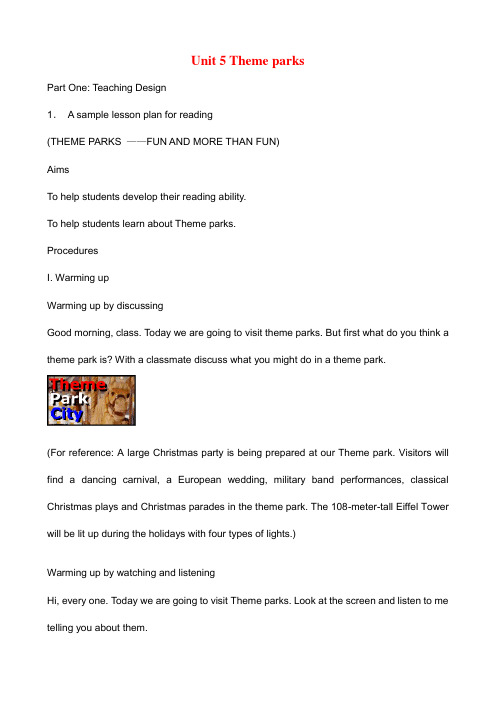
Unit 5 Theme parksPart One: Teaching Design1.A sample lesson plan for reading(THEME PARKS ——FUN AND MORE THAN FUN)AimsTo help students develop their reading ability.To help students learn about Theme parks.ProceduresI. Warming upWarming up by discussingGood morning, class. Today we are going to visit theme parks. But first what do you think a theme park is? With a classmate discuss what you might do in a theme park.(For reference: A large Christmas party is being prepared at our Theme park. Visitors will find a dancing carnival, a European wedding, military band performances, classical Christmas plays and Christmas parades in the theme park. The 108-meter-tall Eiffel Tower will be lit up during the holidays with four types of lights.)Warming up by watching and listeningHi, every one. Today we are going to visit Theme parks. Look at the screen and listen to me telling you about them.This is the Universal's Islands of Adventure which was opened in 1999, making Universal Orlando the nation's second multi-gate theme park resort (after Walt Disney World). IoA was Universal's first non-studio theme park, and was intended to pay tribute to characters from books, comics, cartoons and legend, rather than movies.Of course, that hasn't stopped Universal and other studios from making films about almost every character represented in IoA over the past few years, rendering the park thematically indistinguishable from its sister, Universal Studios Florida.Warming up telling experiencesNice to see you again, boys and girls. As you have all travelled somewhere before I shall ask two of you at random to tell the class about their travel experiences.(For reference: Visiting Disney World was a childhood dream of mine, and I was able to realise it last year. I plan to keep going back, even given the overt commercialism. It is not a place I could live in, but it definitely has magic.One of the best parts was that I was able to interact with most of the Disney characters, even though their appearance and mannerisms varied from the Disney comic books I read.A few select pictures are included here, but my recommendation if you're taking a kid is to make sure they get some time with the characters. I can't think of anything cooler. )II. Pre-reading1. Looking and sayingWork in pairs. Look at the photos and theme parks and predict the contents of the text. When you are ready, join another pair and compare your predictions and the clues that helped you to make the predictions.(For reference: From the photos and title I guess that the text tells about Theme parks where yo u can joy yourselves and have fun with various activities…2. Talking and sharingWork in groups of four. Tell your group mates what you know about theme parks. Then the group leader is to stand up and share your group idea with the class.Boating LakePedaloe boats on ourboating lake with views ofMegafobia. Suitable for upto five people.(For reference: As you wander down Mainstreet USA in the Magic Kingdom Park of Walt Disney World, you might stop and take a peek in the Mainstreet Theatre. Here, Steamboat Willie shows how it all began depicting the first appearance of Mickey Mouse. At this point people usually stop for a bit, perhaps to rest from the hot Florida summer, laugh at Mickey's antics as he uses various animals as musical instruments (long before Beavis and Butthead were throwing cats in drying machines), and walk away amused and entertained.That was Walt Disney's primary goal. Today, people might consider the first cartoon featuring Mickey as art, along with a host of other creative works produced by people who work at Disney. Notable among them are Carl Barks and Don Rosa, whose works sell in the thousands. However, Walt Disney himself never thought that what he, and his employees, did was art: "I don't pretend to know anything about art. I make pictures for entertainment, and then the professors tell me what they mean." )III. Reading1. Reading aloud to the recordingNow please listen and read aloud to the recording of the text THEME PARKS ——FUN AND MORE THAN FUN. Pay attention to the pronunciation of each word and the pauses within each sentence. I will play the tape twice and you shall read aloud twice, too.2. Reading and underliningNext you are to read and underline all the useful expressions or collocations in the passage. Copy them to your notebook after class as homework.3. Reading to identify the topic sentence of each paragraphSkim the text and identify the topic sentence of each paragraph. You may find it either at thebeginning, the middle or the end of the paragraph.WaterfallA steep shoot sends youskipping across a shallowpool of water on a singlesledge. Beware, you mightget wet on this ride.(For reference: 1st paragraph: Parks provide people with a place to amuse themselves and to escape their busy lives for a while. 2nd paragraph: Many parks have been designed to provide entertainment. 3rd paragraph: Theme parks have a certain idea—a certain theme —that the whole park is based on. 4th paragraph: Some are history or culture theme parks. 5th paragraph: The oldest theme park in the world is Disneyland, built near Los Angeles, California in 1955. 6th paragraph: There are also science theme parks. )4. Reading and transferring informationRead the text again to complete the table.5. Reading and understanding difficult sentencesAs you have read the text times, you can surely tell which sentences are difficult to understand. Now put your questions concerning the difficult points to me the teacher.Closing down by doing exercisesTo end the lesson you are to do the comprehending exercisesNo. 1, 2 and 3 on page 34.Closing down by having a discussionDo you lake a theme park? Why or why not?(For reference: All over the world people seek stimulating experiences to take their mindaway from everyday troubles, and the United States is definitely no exception to this rule.Most of its residents have the money and time to entertain themselves as it pleases them --and visiting amusement parks certainly does please them. )Closing down by defining a theme parkWhat is a theme park? Define it in your own words.(For reference: How do theme parks differ from ordinary amusement parks? NationalAmusement Park History Association defines a theme park as "an amusement park inwhich the rides, attractions, shows and buildings revolve around a central theme or group of themes. Examples include the Disney parks, the Six Flags Parks and the Paramount parks." An amusement park, according to NAPHA, is "an entertainment facility featuring rides, games, food and sometimes shows." The World of Coasters’ glossary defines a theme park as "an amusement park which has one or more "themed" areas, with rides and attractions keyed to the theme of their location within the park. Disneyland, Knotts Berry Farm, and Busch Gardens Williamsburg are examples of theme parks." )2.A sample lesson plan for Learning about Language(Word formation)AimsTo help students learn about word formation.To help students discover and learn to use some useful words and expressions.To help students discover and learn to use some useful structures.ProceduresI. Warming upWarming up by discovering useful words and expressionsTurn to page 35 and do exercises No. 1, 2 ,3 and 4 first. Check your answers against your classmates’.II. Learning about Word formationThe basic part of any word is the root; to it, you can add a prefix at the beginning and/or a suffix at the end to change the meaning. For example, in the word "unflattering," the root issimply "flatter," while the prefix "un-" makes the word negative, and the suffix "-ing" changes it from a verb into an adjective (specifically, a participle).English itself does not use prefixes as heavily as it once did, but many English words come from Latin, which uses prefixes and suffixes (you can use the word affix to refer either to a prefix or a suffix) quite extensively. For example, the words "prefix," "suffix," and "affix" themselves are all formed from "fix" by the used of prefixes:∙"ad" (to) + "fix" (attached) = "affix"∙"pre" (before) + "fix" = "prefix"∙"sub" (under) + "fix" = "suffix"Note that both the "-d" of "ad" and the "-b" of "sub" change the last letter.Here are some of the most common Latin prefixes (for the meanings of the Latin roots, look up the words in a good dictionary):ab (away) abrupt, absent, absolvead (to) adverb, advertisment, afflictin (not) incapable, indecisive, intolerableinter (between, among) intercept, interdependent, interprovincialintra (within) intramural, intrapersonal, intraprovincialpre (before) prefabricate, preface preferpost (after) postpone, postscript, postwarsub (under) submarine, subscription, suspecttrans (across) transfer, transit, translateIII. Ready used materials for Word formation了解了英语构词法是迅速扩大词汇量的有效途径之一。
人教版高中英语必修4精品教案Unit 5 Theme parks
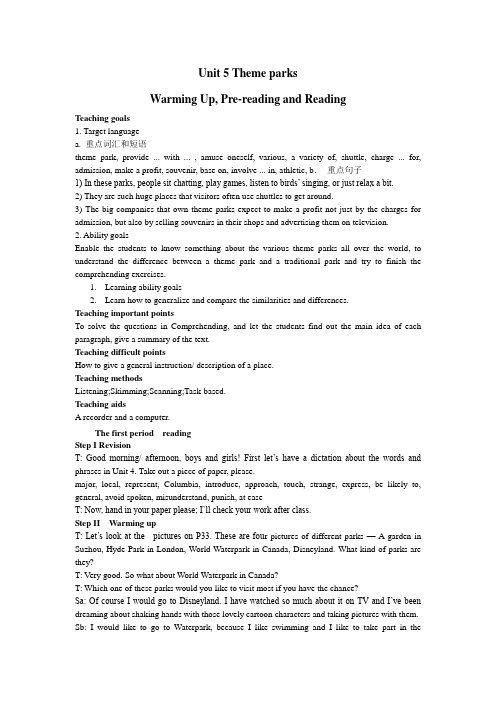
Unit 5 Theme parksWarming Up, Pre-reading and ReadingTeaching goals1. Target languagea. 重点词汇和短语theme park, provide ... with ... , amuse oneself, various, a variety of, shuttle, charge ... for, admission, make a profit, souvenir, base on, involve ... in, athletic, b.重点句子1) In these parks, people sit chatting, play games, listen to birds’ singing, or just relax a bit.2) They are such huge places that visitors often use shuttles to get around.3) The big companies that own theme parks expect to make a profit not just by the charges for admission, but also by selling souvenirs in their shops and advertising them on television.2. Ability goalsEnable the students to know something about the various theme parks all over the world, to understand the difference between a theme park and a traditional park and try to finish the comprehending exercises.1.Learning ability goals2.Learn how to generalize and compare the similarities and differences.Teaching important pointsTo solve the questions in Comprehending, and let the students find out the main idea of each paragraph, give a summary of the text.Teaching difficult pointsHow to give a general instruction/ description of a place.Teaching methodsListening;Skimming;Scanning;Task-based.Teaching aidsA recorder and a computer.The first period readingStep I RevisionT: Good morning/ afternoon, boys and girls! First let’s have a dictation about the words and phrases in Unit 4. Take out a piece of paper, please.major, local, represent, Columbia, introduce, approach, touch, strange, express, be likely to, general, avoid spoken, misunderstand, punish, at easeT: Now, hand in your paper please; I’ll check your work after class.Step II Warming upT: Let’s look at the pictures on P33. These are fou r pictures of different parks — A garden in Suzhou, Hyde Park in London, World Waterpark in Canada, Disneyland. What kind of parks are they?T: Very good. So what about World Waterpark in Canada?T: Which one of these parks would you like to visit most if you have the chance?Sa: Of course I would go to Disneyland. I have watched so much about it on TV and I’ve been dreaming about shaking hands with those lovely cartoon characters and taking pictures with them. Sb: I would like to go to Waterpark, because I like swimming and I like to take part in theactivities in water in this park.Sc: I would go to Hyde Park. I want to go horse-riding, and above all, have the experience of making a speech in front of a crowd of people like a president. That’ll be really exciting.…Step III ReadingSkimmingT: It’s interesting to listen to your ideas. Today we are going to study a passage about theme parks. The title is THEME PARKS—FUN AND MORE THAN FUN. I would like you to read the passage quickly for the first time to get a general idea of the passage. At the same time, please find out the topic sentence of each paragraph.(3 minutes later)T: Have you got the main idea of the passage? Who can tell me the topic sentences of six paragraphs?Topic sentencesParagraph 1. Parks provide people with a place to amuse themselves and to escape their busy lives for a while.Paragraph 2. In recent decades, however, many parks have been designed to provide entertainment.Paragraph 3. Theme parks have a certain idea—a certain theme—that the whole park is based on. Paragraph 4. Some are history or culture theme parks.Paragraph 5. The oldest theme park in the world is Disneyland, built near Los Angeles, California in 1955.Paragraph 6. Other theme parks including marine or ocean parks, science theme parks, and future theme parks.ScanningT: After the first reading, we have all got a general idea of the passage. So I would like you to read it carefully again and try to find the answers to these detailed questions.Teacher shows the questions on the screen.1. What is the basic purpose of theme parks? What do people do there?2. Do these parks charge people for admission?3. What is the purpose of a theme park?5. What activities will be offered to visitors in a sports theme park?6. Can they do shopping there? What can they buy?7. What can visitors see and do in history or culture theme parks?8. What is Disneyland like? What can visitors do there?9. What can people do in marine or ocean theme parks, science theme parks and future theme parks?(10 minutes later)T: Have you got the answers? I would like some of you to answer the questions. Let’s listen and check whether they have got them correctly.Teachers check some students for the answers.suggested answers1. The basic purpose of a park is to provide people with a place to amuse themselves and to escape th eir busy lives for a while. In these parks, people sit chatting, play games, listen to birds’ singing, or just relax a bit. And families go there to have picnics or have fun together in other ways.2. These parks charge people little or no money for admission.3. The purpose of a theme park is to provide entertainment.6. Yes. They can buy sports equipment or clothing, such as basketballs, footballs, sneakers and so on.7. Visitors can see how our ancestors dressed, worked and lived; and how special groups of people dress today, what they eat and what their homes look like. They might go for rides on animals, help cook cultural foods or have their pictures taken in the clothing of emperors or of minority people.8. Disneyland is so different from other parks that it seemed like a place of fantasy. Visitors can enjoy seeing the characters from Disney films, go on exciting rides, visits to castles and get close to life-size cartoon figures. They can also see model villages of life in the past which show how the early settlers in America lived.9. People can see and swim with dolphins and learn about ocean life in an ocean park; They can take an active part in experiments in a science theme park; They can go on imaginary trips to space and use advanced computer techniques to experience life in the future park.Step IV Comprehending (P34)Part 1T: Let’s look back at the title of the passage. THEME PARKS— FUN AND MORE THAN FUN. Why does the writer think that theme parks are places fun and more than fun? I would like you to think about this question and tell me your opinions.S: In my opinion, it means that theme parks are more than amusement parks with rides, such as a Ferris wheel, merry-go-round or a roller coaster, they are such huge places that visitors often use shuttles to get around, and they have a lot of things to see and do. So they are places fun and more than fun.Part 2T: We have read about some of the different theme parks in the world. Have you ever thought of this question: Why do people build so many different theme parks? I would like you to have a class discussion and tell me 3 purposes for people building theme parks according to this passage. (Some time later)T: Please express your ideas.Suggested answersPurpose 1 : to provide entertainment.Explanation 1: because they have a variety of things to see and do.Purpose 2: to make a profit by charging for admission and selling souvenirs.Explanation 2: because they all charge money for admission of the hotels, restaurants, and for the rides and shows in the parks as well, and they sell a lot of souvenirs.Purpose 3: to provide people with some unusual experiences.Explanation 3: because there are parks for people to experience the life in the past, in the future, in the ocean and so on.Part 3T: Let’s sum up the main idea of each paragraph.Suggested answersParagraph 1: Parks provide people with a place to amuse themselves and to escape their busy lives for a while.Paragraph 2: Theme parks have been designed to provide entertainment with a variety of things to see and do.Paragraph 3: Theme parks have a certain idea/ theme that the whole park is based on. Paragraph 4: The history and culture theme parks.Paragraph 5: The Disneyland.Paragraph 6: The ocean parks and the science theme parks.Theme of the passage: Theme parksStep V DiscussionT: If you have enough time and money, would you like to go traveling to see the natural beauty of the country or go the theme parks to enjoy the exciting experiences? Give reasons for your choice.a) Teacher divides the class into groups of four. Each group tries to reach an agreement and to collect as many reasons as possible from the group members.b) After the discussion, the teacher asks a student from each of the groups to report the decision of their group and to give their reasons for the decision.Step VI HomeworkRemember all the new words and phrases in the reading passage.Write a summary of the reading passage using the new words.Unit 5 Theme parksVocabulary and Useful Expressions重点难点1.Parks provide people with a place to amuse themselves and escape their busy lives ofr a while. amuse oneself 自我娱乐,消遣escape v.“逃脱”,液体等“漏出”,“逃避”,被…遗忘escape death 死里逃生2.Though parks share this basic purpose, they find various ways to meet this need.meet可与need, requirement等名词连用,表示“满足…需要,要求”等。
人教版2017高中(必修四)英语unit_5_theme_parks-warming_up_and_listeningppt课件
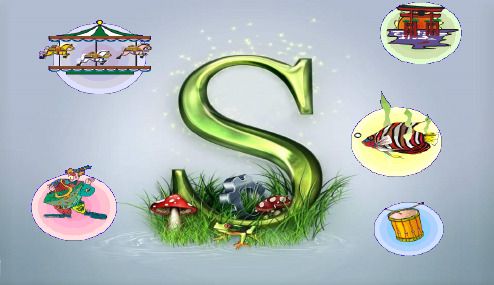
Common parks
A garden in Suzhou 苏州园林Leabharlann Hyde Park 海德公园
A common park
World Waterpark in Canada 加拿大世界水上公园
A theme park
Disneyland 迪斯尼乐园
A common park
A theme park (Disneyland)
Listening on Page 69
Leading in (Discussion) Have you ever been to Sea World or Marine Land? What kind of things do you think visitors can see and do at these parks?
Listening text
SEA WORLD – A FISHY EXPERIENCE
David Evans and Ji Yang are visiting Sea World
in Australia. D= David JY= Ji Yang
D: Where do you want to start? Here’s a park map from the information centre. JY: There are at least two things I really want to do. There’s a show where people water ski on bare feet, and then there’s a dolphin show that’s one of the best in the world. The dolphins are trained to do amazing tricks. After the show we can feed them.
必修4Unit5Themeparks-languagepoints课件
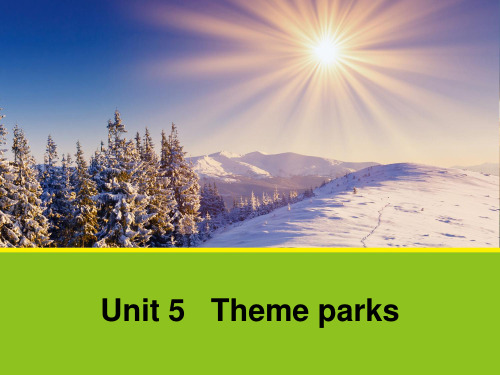
❖ The building is named after Mr Shao Yifu.
作具体用途时是可数名词,a table cloth.
❖ This kind of cloth feels soft. ❖ Clothing各种衣服的总称,只有单数情势。
❖ In winter,the people in the flooded area are lack of clothing to keep warm.
Various theme parks Sports theme parks History theme park Culture theme park Disneyland
Things to do
offer visitors sport to play to watch the past come to life… cook cultural foods… see characters from Disney films
❖ The film is based on a novel by D.H. Lawrence.
❖ This story is based on /upon facts.
❖ 2.involve…in使参与…,使介入…. ❖ Many children were involved in the school play.
The parks are such huge places that visitors often use shuttles to get around
《Theme parks》高中英语必修四Unit 5【2017人教版】
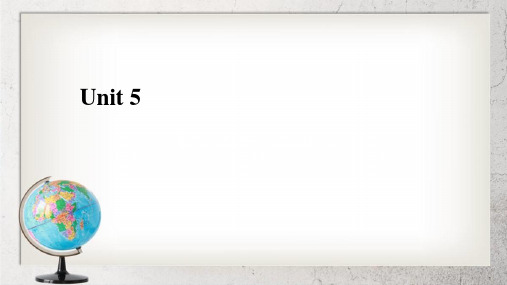
牵手课堂
• Tivoli Gardens
• Tivoli Gardens(蒂沃利公园)is a famous amusement park and pleasure garden in Copenhagen,Denmark.It is one of the oldest amusement parks in the world.
• 单句语法填空。
is swinging
• (1)Public opinion _______________(swing) against the government at present. As far as I am concerned, it is time for the officials to come out to make it clear.
• 单句语法填空。 • (1)The people on this list were chosveanriobuescause, in
__________(variety) ways, they bend the world to their will. • 解析:句意:我们把这些人列入了这个榜单,是因
(2) vary vi.& vt.变化;使不同,使多样化;改变 vary from sth.to sth.从……变化为…… vary in sth.在……方面不同 vary with sth.随着……的不同而变化
• ③The shopping﹣centre sells a variety of goods.
③What was the subject/topic of last night’s lecture? 昨晚讲座的题目是什么?(比用theme好) ④The theme of this year’s conference is “Ends and Means”. 今年会议的主题是“目的与手段”。(比用subject/topic好)
(完整版)高中英语人教新课标必修四Unit5ThemeParks教案

(完整版)高中英语人教新课标必修四Unit5ThemeParks教案Unit5 Theme ParksPeriod One Warming upTeaching aims:1.enable Ss to talk something about parks.2. get Ss to match the names of the parks with the pictures.Teaching important points:Get Ss to know which pictures are theme parks.Teaching method:a. Individual, pair or group workd. DiscussionTeaching procedure:Step I. Leading-inStep II. Warming up.1.warn the students up by some pictures.2.ask the students to think about the two questions.3.get the students to match the names of the parks with the pictures.Step III. Speaking taskAfter matching the names of the parks with the pictures, the students try to guess which are parks and which are theme parks?Period Two ReadingTeaching aims:Get the students to know some famous theme parks—Disneyland, Dollywood and Camelot Park and the attractions of these theme parks through this passage.1. Ability aim:Get some knowledge of some famous theme parks.2. Language aim:Teaching important points:Teaching procedure:Step 1. Warming up.Warm the students up by ask them to tell the differences between parks and theme parks. Step 2. Pre-reading.Ask the students to discuss a question about theme parks.1.What do you think a theme park is?2.What you might do in a theme park.Step 3. Reading.1.SkimmingAsk the students to skim the text and check their ideas and get the meaning of thetitle.2.ScanningAsk the students to scan the text and choose the correct answer in the book./doc/f417913528.html,prehensionAsk the students to read the text paragraph by paragraph, and get some detailinformation.a.Students find out the information to fill in the table of the three famous themeparks.b.Students find out information to decide if the statements are true or false.Step 4. discussions:1.What is the purpose of Dollywood? What kind of people do you think will visit thistheme park ?2.What do you know about ancient English stories? Whatother activities do youimagine there are at Camelot Park?3.Disneyland is a place to have fun. What will you do if you have a chance to visitDisneyland?4.If you have a chance to visit one of these three parks, which will you visit? Why ?Period Three Learning about language Teaching aims:1. Learn some words and phrases in the reading passage.2. Enable the Ss to use some useful structure.3. Learn about word formation .Teaching important points:Enable the students to mater some useful words and phrases.Teaching difficult points:How to use word formation correctly.Teaching procedures:Step I. Learn about some language points in the passage:1.b e famous for “因……而出名”,表示出事物的特征或人物的特长Columbus is famous for his discovery of America.be famous as“作为……而出名”,所接名词作主语的同位语Luxun is famous as a writer.be famous to “为谁所知” 表示某个地方或某个范围的人都知道Disneyland is famous to people all over the world.2.Whichever and whatever you like, there is a theme park for you.whatever = no matter whatwhichever = no matter whichwherever = no matter wherewhenever = no matter whenhowever = no matter how“疑问词+ever”既可以引导名词性从句,还可以引导状语从句,而”no matter+疑问词”只能引导状语从句.Whatever / No matter what happens, don’t be surprised.Take whatever magazines you want to read.3. be familiar with (某人) 熟悉,通晓,精通(某事)I am familiar with some theme parks now.be familiar to (某事) 被(某人)熟悉的These tales are familiar to Chinese children.4. come true 后面不能接宾语,没有被动语态realize 是及物动词, 后接名词作宾语,一般用被动语态.Our dream came true. = Our dream was realized.5. …no wonder tourism is increacing wherever…No wonder / It is no wonder 难怪, 怪不得No wonder you’ve got a headache. You drank too much last night.6. one of + n (pl.) 此结构单独作主语,谓语动词用单数.one of + n (pl.) 其定语从句谓语动词用复数.若one前the或the only修饰谓语动词用单数One of the students has ever been to Disneyland.He is one of the students who have ever been to Disneyland.He is the only one students who has ever been to Disneyland.7. celebrate 表示“庆祝, 祝贺”之意,其宾语是事。
高考英语 Unit 5 Theme parks 新人教必修4【高考复习课件】

A3演示文稿设计与制作 信息技术2.0 高考英语 Unit 5 Theme parks 新人教必修4【高考复习课件】
微能力认证作业
Unit 5 Theme parks
1.various adj.不同的;各种各样的 2.amusement n.消遣;娱乐(活动) 3.swing n.秋千;摇摆 vt.& vi.(swung, swung)摇摆;摆 动 4.attraction n.有吸引力的事物;吸引 5.preserve vt.保存;保留 n.保护区 6.athletic adj.运动的
3.provide sb.with sth.(=provide sth.for sb.) 给某人提供某 物
例句 School provided every students with some books. 学校给每个同学都提供了一些书。
拓展 supply sth.to sb.=supply sb.with sth.给某人提供某物 注 意 “provided/providing that-clause” 意 为 “ 如 果……”,引导条件状语从句,同时“supposing that-clause”和 “on condition that-clause”也可用来表示假设。
运用 完成句子
(1)机场为旅客提供了各种免费的食品。 The airport __p_ro_v_i_d_e_d_/s_u_p_p_l_ie_d_ the passengers__w_i_th_ various foods free of charge. (2)志愿者每天为他们提供干净的水。
高考英语一轮复习话题20主题公园(Unit5Themeparks)新人教版必修4
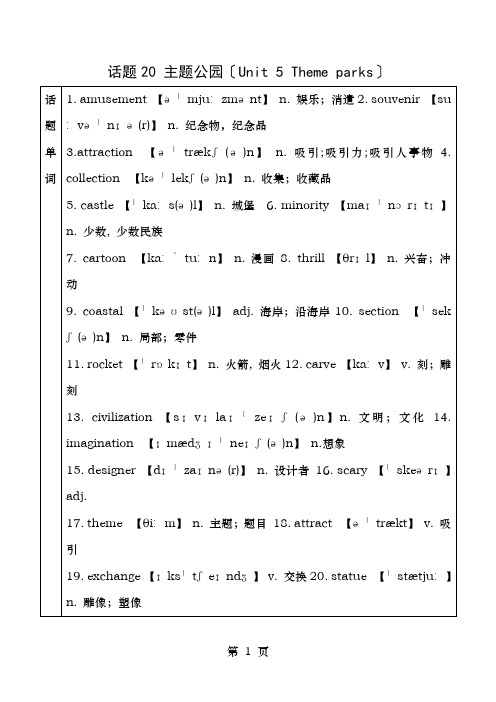
话题20 主题公园〔Unit 5 Theme parks〕话题短语1. cut off 切断 2. take turns 轮流3. a variety of各种各样4. base on 以……为根底5. get started 开场6. historical heritage 历史文化遗产7. place of interest 名胜8. home and abroad 国内外9. be involved in卷入;参与10. make profits 盈利11. name after以……命名12. be located in 位于13. one after another 一个接一个地14. enjoy oneself 过得愉快15. play around到处玩16. meet one’s need满足某人需要17. take a tour旅游18.no wonder难怪话题句子1. Whichever and whatever you like, there is a theme park for you!无论你喜欢哪一个,不管你喜欢什么,都会有一个适合你主题公园!2. With all these attractions, no wonder tourism is increasing whereve there is a Disneyland.有这么多引人入胜东西,难怪哪里有迪斯尼乐园,哪里旅游业就会开展。
3. To enter a world of fantasy about ancient England, come to Camelot Park!想进入古英格兰梦幻世界吗?那就来卡默洛特公园吧!4. Futuroscope is not only for individuals, but is also the perfect mix of fun and learning for class outings.观测未来主题公园不仅仅适合个人,也适合学生全班出游,因为它是娱乐与学习完美结合。
人教新课标英语必修4-Unit-5--Theme-Parks教案(重点单词讲解)

Unit 5 Theme ParksDate:_______________Teaching aims:1.Get the students to learn the new words and expressions in this unit.2.Let the students to get some information about parks and theme parks.3.Develop students’ ability in reading and speaking English.4.Get some knowledge about word-formation.Teaching difficult points:1.Learn to use the new words and expressions correctly.2.Retell the passage .3.Learn to guess the meaning of a new word by using the knowledge ofword-formation.Teaching important points:1.Remember the new words and expressions as many as possible.2.Get the general idea and try to retell the passage.3.Learn to use the new words and expressions correctly.4.Learn to use the knowledge of word-formation to remember new words. Teaching methods:1.Task-based teaching and learning.2.Cooperative learning.Ability aims:1.Learn to retell the passage according to their own notes.2.Get some knowledge about word-formation , try to use it to guess the meaning ofa new word.Emotion aims:1.Get some knowledge about parks and theme parks, and get to know that themeparks can offer us not only amusement, but also kinds of knowledge and exciting experiences.2.Develop students’ sense of cooperative learning.Teaching procedures:Step One: Leading-inHave a free talk about their experiences of parks.1.Have you ever been to any parks? What impressed you deeply in the park?2.Have you ever heard about Disneyland?Step Two: Warming upSB Book 4 Page 33.Step Three: Pre-readingWhat do you think a theme park is?Skim the passage on page 34 and try to check your ideas.Step Four: Reading1.Fast reading2.Intensive reading and notes-making.3.Retell the passage according to their own notes.Step Five: Homework.Try to finish the exercises of the unit in the students’ book.Postscript:_____________________________________________________________________ _____________________________________________________________________ _____________________________________________________________________Date:_______________Words and expressions:Teaching aims:1. Teach the new words and expressions.2. Let the students recite these new words.Teaching important point:To make the students have a full understanding of the words.Teaching difficult points:1. To improve the students’ ability.2. To enable the students to master the words.1. theme n(谈话、写作或乐曲的)主题,题目,主旋律theme park主题公园theme song主题歌The theme of our discussion today is “Asia in the1990s”.今天我们讨论的主题是二十世纪九十年代的亚洲。
人教新课标高中英语必修四Unit 5 Theme Parks全章教案
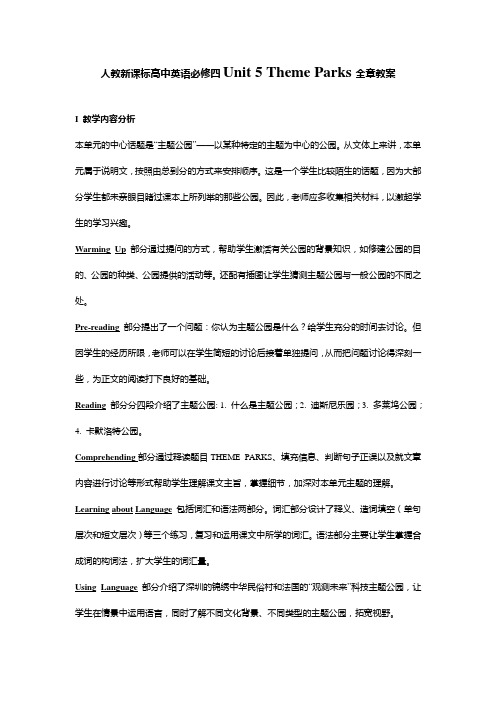
人教新课标高中英语必修四Unit 5 Theme Parks全章教案I 教学内容分析本单元的中心话题是“主题公园”——以某种特定的主题为中心的公园。
从文体上来讲,本单元属于说明文,按照由总到分的方式来安排顺序。
这是一个学生比较陌生的话题,因为大部分学生都未亲眼目睹过课本上所列举的那些公园。
因此,老师应多收集相关材料,以激起学生的学习兴趣。
Warming Up 部分通过提问的方式,帮助学生激活有关公园的背景知识,如修建公园的目的、公园的种类、公园提供的活动等。
还配有插图让学生猜测主题公园与一般公园的不同之处。
Pre-reading部分提出了一个问题:你认为主题公园是什么?给学生充分的时间去讨论。
但因学生的经历所限,老师可以在学生简短的讨论后接着单独提问,从而把问题讨论得深刻一些,为正文的阅读打下良好的基础。
Reading部分分四段介绍了主题公园: 1. 什么是主题公园;2. 迪斯尼乐园;3. 多莱坞公园;4. 卡默洛特公园。
Comprehending部分通过释读题目THEME PARKS、填充信息、判断句子正误以及就文章内容进行讨论等形式帮助学生理解课文主旨,掌握细节,加深对本单元主题的理解。
Learning about Language 包括词汇和语法两部分。
词汇部分设计了释义、造词填空(单句层次和短文层次)等三个练习,复习和运用课文中所学的词汇。
语法部分主要让学生掌握合成词的构词法,扩大学生的词汇量。
Using Language 部分介绍了深圳的锦绣中华民俗村和法国的“观测未来”科技主题公园,让学生在情景中运用语言,同时了解不同文化背景、不同类型的主题公园,拓宽视野。
Learning Tip 提醒学生重视有关构词法知识的学习,让学生理解构词法知识对于英语词汇学习的重要意义,而且此部分对构词法中的转化法又做了补充说明。
II.教学重点和难点1.教学重点(1)本单元教学目的和要求中的生词和短语;(2)掌握英语构词法:合成法和派生法;(3)学会欣赏和介绍主题公园。
高中英语_Unit5Themeparks教学设计学情分析教材分析课后反思

⾼中英语_Unit5Themeparks教学设计学情分析教材分析课后反思教学设计设计思路:本节课除却达成常规的教学⽬标,特别注重传授语篇分析的相关知识。
我依据迁移原则,即从已知知识到未知知识迁移的作为突破⼝,先从学⽣已经掌握的概念着⼿,循序渐进地逐步展开语篇分析,让学⽣在潜移默化中掌握语篇分析的新途径。
【教学活动⼀:语篇模式分析】教师按照说明⽂的各个组成部分展开课⽂结构,最后引导学⽣分析整篇⽂章的语篇模式,逐步习得“General-Particular pattern”这⼀语篇模式,包括这种语篇模式的必备要素和备选要素。
语篇分析重在分析语篇的功能或意义,有利于学⽣理解作者的写作意图,丰富学⽣语篇图式结构,并形成阅读技能。
【教学活动⼆:情景语境分析】情境语境分析涉及语篇的三个变量,即语场、语旨和语式。
在该活动中,教师通过交流互动,让学⽣掌握⽂章的中⼼、参与者以及话语⽅式,旨在让学⽣掌握⽂章的三个变量,继⽽把握语篇的整体内容。
【教学活动三:语⽤分析】语⽤分析⼀般主要包括作者⾏⽂的主要⽬的,读者对象,⽂章出处及作者观点的推测等。
通过教师互动交流,让学⽣理解作者⾏⽂的⽬的、推测作者的观点等,掌握语⽤分析的概念。
【教学活动四:话题与词汇链分析】我通过让学⽣从上下⽂语境中找出话题的相关词汇链,培养学⽣在语境中理解语词和运⽤词汇的能⼒,建⽴话题与词汇衔接的概念。
其⽬的是巩固本节课所学的词汇,以期在写作中得到灵活运⽤,为学⽣完成课后作业奠定基础。
【教学活动五:思维能⼒训练】思辨性思维强调在透彻理解⽂章的基础上,使学⽣能够客观地分析与评价⽂章,并运⽤已学知识有所总结与概括。
创新性思维让学⽣根据所掌握的知识,举⼀反三,延伸到⽣活中其他话题,并利⽤已有知识解决⽣活中的问题。
【教学活动六:作业布置】这节课的课后作业是运⽤⼀般-特殊型模式及相关话题词汇链,介绍主题公园的详细信息。
这⼀环节针对学⽣语⾔知识的巩固与拓展、语⾔能⼒的培养和学⽣素养的发展⽽设计,同时期望达到“以写促学”的⽬的。
高中英语人教新课标必修四Unit5Theme parksFun And More ThanFun教案

英语必修四Unit 5 Theme parksReading: Theme Parks-Fun And More Than Fun一、教材分析和教材重组1. 教材分析本单元以Theme parks 为话题,旨在通过本单元的教学,使学生了解分散于世界各地的各种各样的主题公园,学会向别人介绍某个景点的大体情况,以及计划各项活动,同时培养学生对世界及生活的热爱。
(1)Warming up通过向学生呈现四个风格各异的世界著名主题公园,激发学生学习本单元的兴趣。
(2)Pre-reading 通过学生对主题公园里活动的想象,交流了解主题公园的有关知识。
(3)Reading 通过介绍世界各地形式各异的主题公园概况,使学生了解风格迥异的各国主题公园。
(4)Comprehending 让学生从文章的标题及各段大意来整体理解课文。
2.教材重组*将Warming up、Pre-reading、Reading 和Comprehending四部分整合在一起上一节阅读课。
二.阅读课:Unit 5 Theme ParksReading: Theme Parks-Fun And More Than Fun“阅读”(Reading)部分介绍了主题公园——一种以围绕一个或多个主题展开的,提供各种方式的游戏、展览、演出的娱乐中心。
并列举了三个例子(Disneyland, Dollywood, Camelot Park)来说明主题公园的多样性和丰富性。
指出人们不仅可以在主题公园中使自己身心放松并得到娱乐,同时还可以从娱乐中获得知识和有益的体验。
< 1 > Teaching goals 教学目标Enable the students to know something about the various theme parks all over the world, to understand the difference between a theme park and a traditional park and try to finish the comprehending exercises.< 2 > Skill Goals 技能目标* Talk about different types of theme parks in different cultures* Words:theme, amusement, various, variety, rides, equipment,experiment, advance, advanced,* Phrases:be famous for , no wonder , in advance ,be modeled after , get close to , come to life, * Sentences :(1)There are various kinds of (各种各样的)theme parks, witha different park for almost everything: food, culture, science,cartoons, movies or history.(2)Some parks are famous for (以…闻名)having the biggest or longest roller coasters(过山车), others for showing the famous sights(视觉)and sounds of a culture(文化).(3)With all these attractions(吸引), no wonder(难怪)tourism is increasing(增长)wherever there is a Disneyland.< 3 > Teaching important points 教学重点难点To solve the questions in Comprehending, and let the students find out the main idea of each paragraph, give a summary of the text.< 4 > Teaching methods 教学方法Skimming ; Scanning ; Task-based .< 5 > Teaching aids 教具准备A recorder and a computer.< 6 > Teaching procedures && ways 教学过程与方式Step 1 Greeting ( 2 minutes )T: Class is begin . Stand up, please . (Ss : …)T: Good morning , boys and girls . (Ss : …)T: Sit down, please . (Ss : …)T: Boys and girls, how are you today ? (Ss : …)T: What day is it today, class ? (Ss : …)T: Today we are going to learn Unit 5 Theme Parks. First let’s read the words in Unit 5. Please open your English books andturn to page 99. Read after me, please. Are you ready? (Ss: …)OK, let’s begin!Step 2 Read the words in Unit 5 ( 4 minutes )Step 3 Enjoy pictures and short videos ( 3 minutes )T: Very good! Boys and girls, please look out of the window.What’s the weather like today? (Ss : …) The weather isfine, so let’s go to the park for fun, shall we? Is that a good idea?(Ss : …)OK! Let’s go! Please look at the screen. Let’senjoy some beautiful pictures about parks and watch two shortvideos about theme parks.Step 4 Learn three sentences ( 6 minutes )T: Boys and girls, we have seen some beautiful pictures about parks. Do you know theme parks? Ok, let’s learn threesentences to know something about theme parks.(1)There are various kinds of (各种各样的)theme parks, with a different park for almost everything: food, culture,science, cartoons, movies or history.(世界上)有各种各样的主题公园,不同的公园有不同的主题,但几乎囊括了一切:食物、文化、科学、卡通、电影及历史。
人教新课标高中英语必修四Unit5Themeparks教案(1)

Unit 5 ,Γheme ParkS 全单元教案教学目的和要求(TeaCIilng aims and demands)一、教学内容分析本单元的话题是“主题公园”,教师可以从学生身边的或熟知的主题公园谈起,帮助学生对这一话题有个较为全面的了解。
“热身,,(WanniIlg UP)与“读前,,(Pre-IeadIng)部分,先以图片呈现不同风格的主题公园,引起学生兴趣,然后提出问题,便于学生小组讨论。
“阅读"(Reading)部分内容有趣,易于理解C作者不仅讲述了主题乐园与普通公园的异同以及各种类型的主题公园,还指出了人们不仅可以在主题公园中使自己身心放松并得到娱乐,同时还可以从娱乐中获得知识和必要的体验。
(Comprehendmg)部分,通过释读题目(THEME PARKS-FUN AND MORE THANFUN),明确住造主题公园的目的,帮助学生加深对本单元主题的理解。
“语言学习”(LeamiIIgaboutLangUage)部分,涉及阅读中的重点词汇,归纳、介绍了一些构词法知识,如合成法、派生法(前缀、后缀),对于学生有效的记忆词汇、了解英语词汇的构成会有一定的帮助。
“语言运用”(USing LangUage)部分,通过听、读和说、写的训练,介绍了深圳的中华民俗文化村、法国的“观测未來” (FUTUROSCOPE)科技主题公园,让学生在情景中运用语言,同时了解不同文化背景、不同类型的主题公园,拓宽视野。
写作部分要求学生以义务导游的身份自选一个主题乐园,写一篇介绍短文:说的部分、要求学生以“问路”为题,进行角色扮演。
这些为学生提供了更多使用本单元所学语言的情景和机会。
“小结"(Summing UP)部分要求学生就本单元的话题、词汇和结构三个方面进行归纳和总结。
本单元语法部分的构词法对于英语词汇学习有着重要的意义。
可以结合学生用书附录中有关构词法的语法材料,小结合成法、派生法和转义法。
高中英语必修4 Unit5 Theme parks单元测试题[含听力材料]
![高中英语必修4 Unit5 Theme parks单元测试题[含听力材料]](https://img.taocdn.com/s3/m/bcb31c861ed9ad51f11df263.png)
Unit 5 听力材料及参考答案(Text 1)W: You seem to have a lot of work to do at your office.M: That’s true, but the work is interesting. I don’t mind extra hours at all.(Text 2)W: I want to ask the Johnsons to come to the party. Do you know their address?M: No, but I’d like them to come. I think Tom can give you their address.(Text 3)M: Is Jane looking forward to coming home for the summer?W: She’s counting the days.(Text 4)W: I’m so excited that I couldn’t sleep the whole night.M: I’d be excited too if I had my passport, visa and boat ticket.(Text 5)M: How do you like these paintings in the museum?W: Not too bad.M: In my opinion, Picasso is the greatest Spanish painter. Do you think so?W: Well, I’m not sure.(Text 6)W: Hello. Sunnyside Inn. May I help you?M: Yes, I’d like to book a room for two on the 21st of March.W: Okay. Let me check. Well, would you like a smoking or non-smoking room?M: Well, how much is the non-smoking room on the 20th?W: 80 dollars, plus the 10% room tax.M: Okay, that’ll be fine.W: All right. We look forward to seeing you on March 20th. Oh, by the way, could I have your name, please?(Text 7)M: Mum, I don’t feel well.W: Oh, dear! What’s wrong?M: I don’t know. I’ve got a headache and a cough. And my back aches, too.W: You’d better stay in bed until tomorrow. If you’re not better by then, I’ll take you to see the doctor. Drink plenty of water, and take this medicine three times a day.M: OK. Could I watch the basketball match on TV, Mum?W: No, you must lie down and have a rest.(Text 8)W: What are you going to do tonight?M: Oh, I’m going to stay home and study. My final exam is coming up next week. W: Is it going to be difficult?M: It will be harder than the mid-term exam, I’m sure.W: Was that one difficult?M: It was the most difficult exam that I’ve ever had.W: Then maybe this one will be easier.M: Well, I’m going to spend more time studying for it than I did for the mid-term exam.W: What are you going to do after the exam?M: I don’t know. Maybe I’ll look for a better job.W: What’s the matter with this job?M: It isn’t the worst job in the world, but it isn’t the best job, either.W: Do you want to work for a bigger company?M: I want to get ahead. I want to make more money.(Text 9)W: Did you write your address on the envelope?M: Yes, I did.W: Where are you going to post it?M: To England.W: How do you want to send it?M: I guess I will send it by air mail.W: Does it have anything valuable inside?M: Yes, I enclosed a check and some photographs.W: Then you’d better send it by registered mail.M: That’s a good idea. Will you take care of that for me?W: I’m sorry, sir. You’ll have to take your letter to the next window.(Text 10)Mr Hill was a chicken farmer. He had hundreds of chickens, and sold the eggs and the meat and got quite a lot of money from them, but he lived in a very hot part of the country, and he found that his hens laid hardly any eggs in the summer. So he decided to put air conditioning into his chicken house so that his hens would lay well all through the year and he could get more eggs and in that way earn more money. The owner of the company which sold the air conditioning came to see him, and when he saw Mr Hill’s house, he thought that he might be able to persuade him to buy some air conditioning for it too. “Your wife would be much happier and more comfortable then,” he said to Mr Hill. But Mr Hill was not interested. “My wife doesn’t lay eggs,” he said.参考答案:1-5 BBCCA 6-10 ABABA11-15 BCBAB 16-20 ABCAB21-25 CACAD 26-30 DBCDA31-35 ACADB 36-40 CADBD41-45 ACABB 46-50 BCDDA51-55 CBCDB 56-60 CADBB61-65 DCEAD66. equipment67. brand 68. test69. sneakers 70. experiments71. fantasies 72. athletic73. various 74. volunteers75. souvenirs76. a variety of77. amused myself by 78. the minority79. not only / just; but also80. nor / neither does he like81. theme 82. creature83. various 84. advance85. minority 86. get close to87. jungle 88. equipment89. amuse 90. profit91. Life will seem very quiet after the excitements of our holidays.92. There is very little profit in selling land at present.93. This is the up-to-date information about the development of agriculture.94. a. Many people find her advanced idea difficult to accept.b. Many people find it difficult to accept her advanced idea.95. I often go hiking because I like getting close to nature.One possible version:Xinhua Stamp Printing Works is in the west of the city. It’s just 15 miles away from the center of the city. It’s 2.3 square miles in area.When you enter the Stamp Printing Works, you may see two beautiful gardens on both your sides and an office building in front of you. Behind it, there lies a meeting hall between the garage in the north and the two shower rooms for men and women workers in the south. Then there stands a big and wide playground. Across it, you can see four workshops, behind which there are four dorms for the workers.。
- 1、下载文档前请自行甄别文档内容的完整性,平台不提供额外的编辑、内容补充、找答案等附加服务。
- 2、"仅部分预览"的文档,不可在线预览部分如存在完整性等问题,可反馈申请退款(可完整预览的文档不适用该条件!)。
- 3、如文档侵犯您的权益,请联系客服反馈,我们会尽快为您处理(人工客服工作时间:9:00-18:30)。
Teaching Plan Unit 5 Theme Parks —Listening and speakingTeaching PlanUnit 5 Theme Parks——Listening and speaking Students’ level: Senior 2Teaching content: Unit 5 Theme Parks—listening and speakingTeaching Duration: 40minutesI. Teaching aims:1. Knowledge aims(1) To enable the students to introduce a theme park by using the function phrases and sentences: They celebrate…by doing…; …is one of the most popular…; they are doing…,which be…; …is called….(2) To help the students review and grasp the words from the reading part of Unit 5: theme park, minority, celebrate, experience.(3) To help the students learn about Chinese minority cultures.2. Ability aims(1) To develop the students’ listening skills to grasp specific information.(2) To develop the students’ speaking skills to introduce minority cultures briefly.(3) To develop the students’ speaking skills to express their personal interests in the minority cultures.3. Emotional aims(1) To cultivate the students’patriotism by learning more about the minority cultures.(2) To enhance the students’ confidence in Chinese culture and raise the students’ awareness of spreading Chinese minority cultures.(3) Strengthen the sense of cooperation with others.II. Important and difficult points of teaching:Guide the students to make a role play by using the words, phrases and sentence structures learned in the class.III. Teaching methods:1. Task-based Language Teaching.2. Communication-based Language Teaching.3. Individual, group work and interactive work.IV. Teaching aids:1. A multi-media computer.2. The blackboard and chalk.V. Teaching procedures:Step 1. Lead-in (1 minute)Enjoy a song before class to arouse the students’ interest in this class and then introduce the topic of minority cultures, Yi People and the first Yi Autonomous County---Eshan with a song.【设计意图】:通过课前欣赏学生比较熟悉的《七月火把节》这首歌曲,营造轻松愉快的氛围。
同时结合峨山学生的实际情况,引出彝族的话题,激发学生的学习兴趣;也为本堂课所要拓展的主题公园类型——少数民族文化主题公园埋下伏笔。
Step 2. Warming up(5 minutes)1. Show some pictures about the culture of Yi People and guide the students to introduce the festival, food, clothes and house of Yi People in sentences:(1) They are celebrating the Torch Festival by singing and dancing.(2) Pounded Chicken is one of the most popular foods in Yunnan.(3) They are dancing in their folk clothes, which are beautiful and colorful.(4) The houses Yi People live in are called adobe houses.And then guide the students to make the following mind map:【设计意图】:通过欣赏有关彝族文化的图片,引入celebrate, the Torch Festival, Pounded Chicken等词汇和句型,为下一环节的听力练习做准备。
同时,引导学生通过mind map的形式,梳理少数民族文化涵盖的内容:festival, food, clothes , house , singing等,从思维和文化层面为听力和对话练习做铺垫。
2. Lead into the theme park—Yunnan Folk Culture Villages.【设计意图】:引出听力对话中将要出现的三个人物:两个美国游客和一个导游,以及本堂课的主题公园——云南民族村,让学生对听力材料做听前预测。
Step 3. Listening (15 minutes)Task 1.Listen to the conversation and pick out(√) the subjects that they are talking about.( ) clothes ( ) food( ) houses ( ) language( ) festivals ( ) history【设计意图】:听力材料是根据本堂课的教学目标而设计的。
通过泛听,让学生了解对话中有关彝族文化的话题。
Task 2. Listen again and choose the best answer to each question.1. What do Yunnan Folk Culture Villages show?A. They show very interesting activities in different places in Yunnan.B. They show different cultures of different minorities in Yunnan.C. They show different attractions(景点) in Yunnan.2. How do the Yi People celebrate their festival?A. By splashing(泼) water on each other.B. By holding a dragon-boat race.C. By dancing and singing around a big burning fire.【设计意图】:通过泛听及选项的学习,让学生了解云南民族村这一主题公园的主题——少数民族文化,以及彝族火把节的庆祝方式。
同时加深学生对重点单词celebrate的印象。
Task 3.Listen again and complete the conversations.Guide: Hello, everyone! I’m Mark, your guide.Folk Culture Villages. This is a theme park which shows the differentof different minorities in Yunnan, such as Dai, Hui, Yi, and Miao. Ok,now, let’s go to the first station---the Yi Village. Yi People are veryVisitor A: Would you please tell us more about it?Guide: Yes, of course. As you walk around the Yi Village, you can see howtheir life.Visitor B: Do they have their own special clothes, some clothes that arequite different from other minorities?Guide: Sure. Look, this is the clothes of the Yi people. They are veryVisitor B: Wow, how nice!What about their food? Do they have someunique food?Guidedelicious, but a little bit spicy.Visitor AGuide: That would be the Torch Festival. The Yi People usually celebrate itVisitor B: Wow, that’s r eally interesting! No wonder it’s charming.Visitor A: Can we visit another minority village?Guide: Definitely. If you want to learn about more minorities, l et’s move to next village. Come on!【设计意图】:通过细听,训练学生对特定信息的捕捉能力,同时植入一些用于介绍少数民族文化的词汇、短语和句型,并对其阴影标注,通过视觉效应及课堂齐读的方式进行强化,为下一环节的Speaking做好准备。
